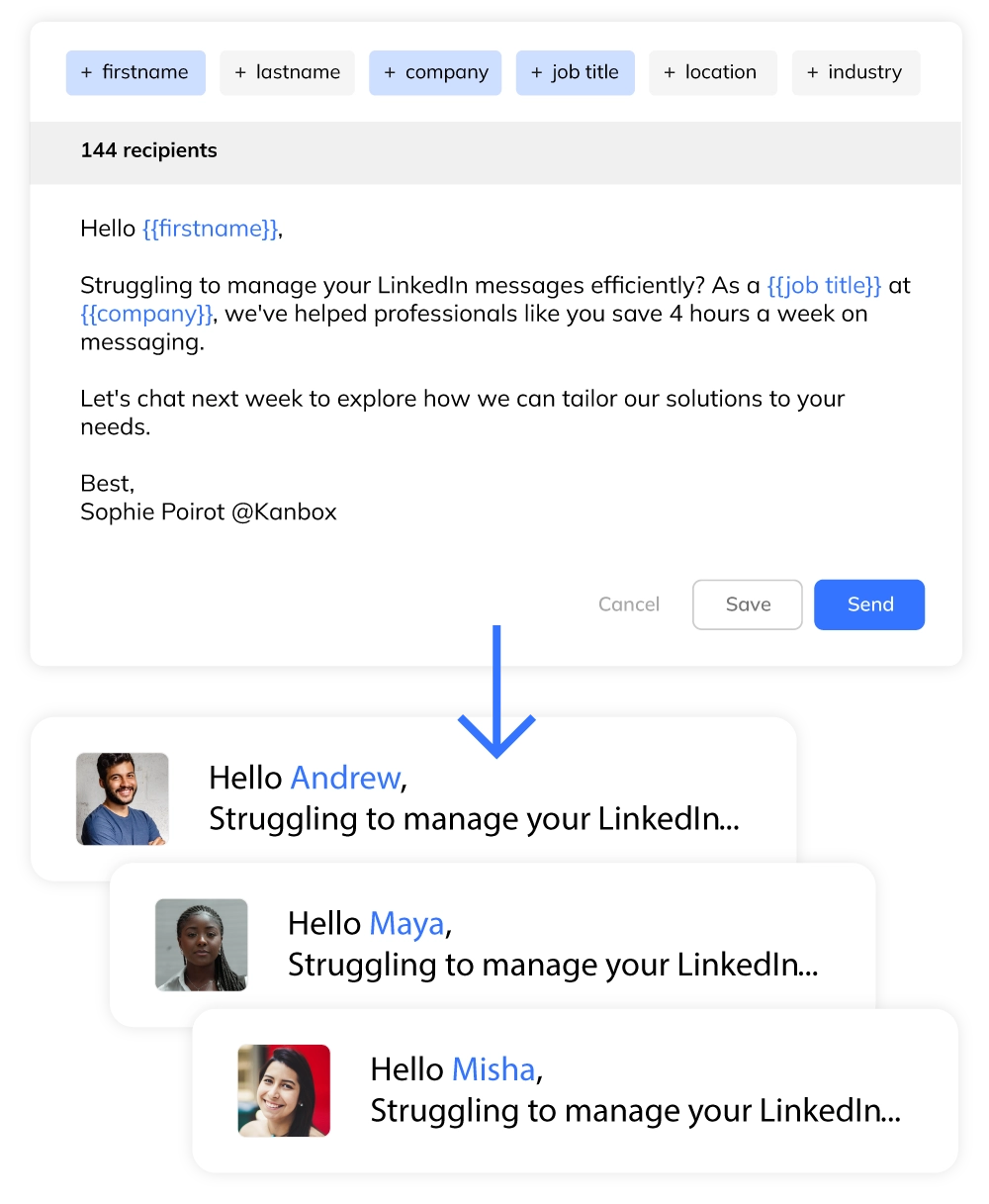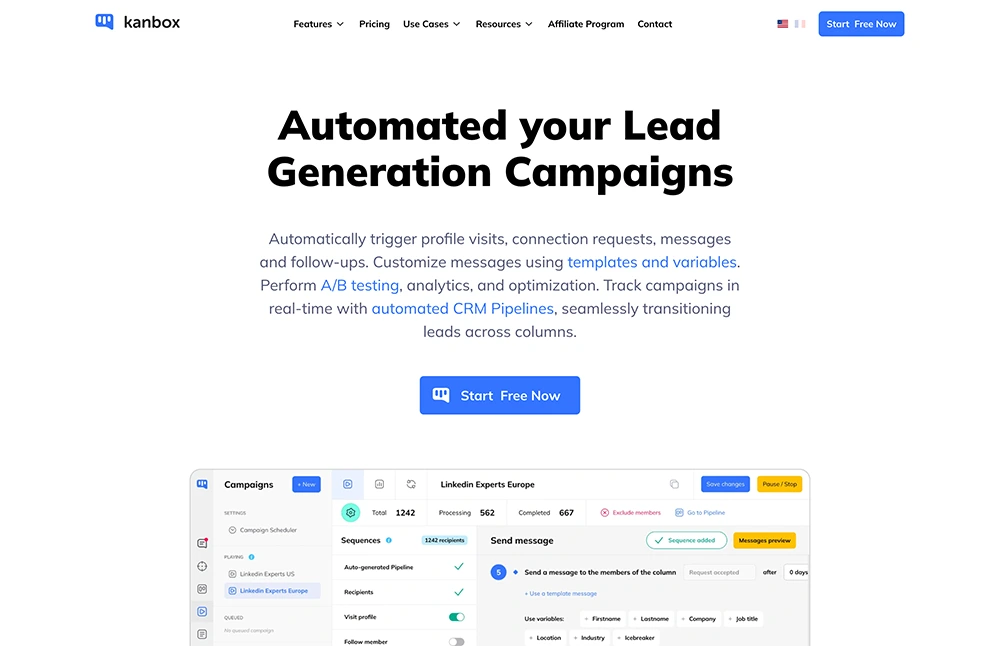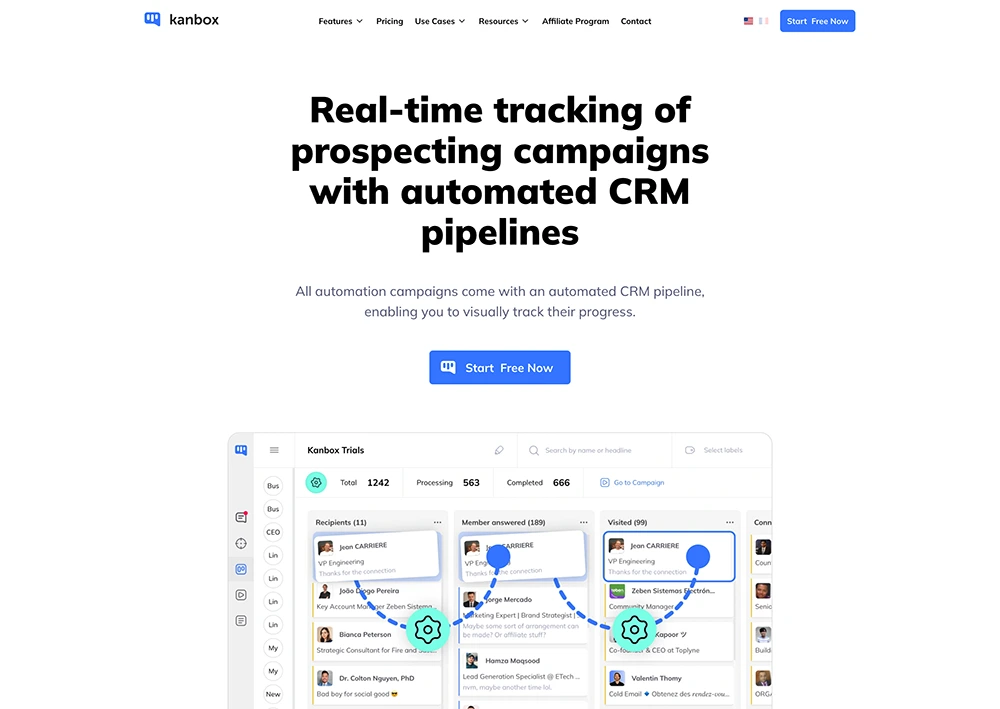Can I generate new leads with AI? All you should know
AI is not news anymore, it’s everywhere, and you either learn how to use it to your benefit or you stay behind the rest. In Sales and Marketing, and particularly lead generation, AI is changing the game completely.
As technology evolves, AI's ability to analyze data, predict outcomes and automate tasks increases, making it a powerful (and needed!) ally for successful lead generation as well as other tasks whether repetitive or not. In this article we take a look at how artificial intelligence can directly help teams to generate leads and improve their performance in order to achieve their objectives and take them even further.
Understanding AI for Lead Generation
Understanding AI's role in a lead generation process means discovering how artificial intelligence can transform the way businesses identify and nurture leads into potential customers. AI consists of advanced technologies such as machine learning, natural language processing and predictive analytics to process and analyze vast sets of data with remarkable speed and accuracy, nearly impossible to humans.
What is AI?
Artificial Intelligence refers to the simulation of human intelligence in machines that are programmed to think, learn and adapt to challenges and new tasks. These machines can perform tasks that typically require human intelligence, such as decision-making, understanding language, visual perception and problem-solving, doing all of that faster than any human could do.
AI is made of several subfields, machine learning being the pillar one, where systems continuously learn from data, and deep learning, which intends to mimic the human brain through neural networks between data points, much like a brain works. By taking advantage of these capabilities, businesses can transform large amounts of raw data into actionable information, simplifying and improving processes and decision-making.
What is lead generation and how does it work?
So we get all definitions clear, lead generation is the process of attracting and converting prospects into people who have expressed an interest in your company's products or services, sometimes from completely cold approaches into warm leads. The process involves identifying potential customers (leads), contacting them through various marketing strategies, using different channels (such as email or LinkedIn messages) and nurturing them until they are ready to make a purchase or at least engage on a sales conversation. In summary the objective of lead generation is to build a pipeline of qualified leads that can be passed on to the sales team for further engagement and conversion into paying customers.
The lead generation process can start in many ways but typically begins by either trying to start a conversation with potential prospects or by attracting visitors to your website or landing page through a variety of channels, such as search engine optimisation (SEO), content marketing, social media, email marketing and paid advertising. Once visitors are on your site or have replied directly to one your messages or emails, the next step is to convert them into leads by encouraging them to provide more details through forms, registrations or calls to action (CTAs). This happens usually by offering something of value in return, such as a free ebook, webinar registration, newsletter subscription or product demonstration, without forcing a commitment of any kind.
Once a prospect has provided their information, they enter the nurturing phase. This phase involves building a relationship with the prospect through targeted and personalized communication, based on the information we already collected and know about them. Companies typically use a variety of tactics, such as email marketing or social media, via LinkedIn messages, for example with engaging and personalized content, to keep prospects interested and move them along the sales funnel. The initial aim is to educate and inform prospects about the benefits of a product or service, addressing their pain points, their frustrations, and building trust until they are ready to make a buying decision.

How Does AI Work in Lead Generation?
AI uses various technologies such as machine learning, natural language processing (NLP) and predictive analytics to analyze big amounts of data which can prove to be tremendously helpful for lead generation.
Machine learning algorithms can identify patterns and trends in the data that humans might miss, allowing companies to target the right audience with greater accuracy, delivering the right message, personalized, at the right timing, without much human effort.
NLP enables AI to understand and interact with human language, facilitating more effective communication with potential prospects, resembling a real human interaction, but fully automated. There are different NLP models, and some might be more indicated for certain businesses and industries than others.
Predictive analytics uses historical data to forecast future results, helping businesses to anticipate customer behavior and optimize their marketing strategies accordingly, by knowing what worked before and what didn’t work, with the AI tools automatically taking the best decisions.
What are The Benefits of Using AI for Lead Generation?
The use of advanced technologies such as artificial intelligence has changed the game for businesses looking to improve their lead generation efforts without increasing the team or the resources put into it. AI offers a suite of benefits that speeds up and empowers sales teams in every step of the lead generation process. From analyzing vast amounts of data with unparalleled accuracy to personalizing customer interactions, AI enables businesses to identify and engage with potential leads more strategically and on a much bigger scale.
By integrating AI into their lead generation strategies, businesses increase the quantity of leads, and also improve their quality, backed by extensive data sets, ensuring a higher conversion rate and ultimately boosting growth and profitability.
Supercharging Your Data Analysis
AI can analyze and test large datasets quickly and accurately, providing insights that can help not only to identify potential leads but finding the best messages that generate more engagement.
This data-driven approach enables businesses to target the right audience with personalized messages, managed easily. At is analyzes customer demographics, buying behavior and interaction history, all at once and in only fractions of seconds, AI can segment audiences more effectively and tailor marketing efforts to meet specific needs and preferences, making them more likely to succeed.
This level of personalisation directly improves engagement and therefore the chance of conversion, as customers receive relevant and timely information that matches their interests and their behaviour.
Improve Efficiency of Your Campaigns
Automating lead generation tasks with AI instantly reduces the time and effort required by sales and marketing teams. AI tools can take over repetitive tasks such as data entry, lead assessment and emailing, allowing human resources to focus on much more strategic activities. This increased efficiency speeds up the lead generation process and also improves productivity, as teams can devote more time to developing and nurturing high-potential leads and innovative marketing campaigns.

Personalized Marketing Strategies
Artificial Intelligence can help you easily create personalized marketing campaigns by analyzing customer behavior and preferences. Personalized content is more likely to attract potential leads and convert them into customers as it’s more relatable.
By leveraging AI to track user interactions across different channels, brands can deliver targeted messages that address specific pain points and interests, backed by historical data. For example, AI can recommend products based on previous purchases or suggest content that matches a user's browsing history. This level of personalisation enhances the customer experience, promotes loyalty and increases the likelihood of return visits, without representing more work for the business..
AI Tools for Lead Generation
As businesses seek to remain competitive and maximize their resources, the integration of artificial intelligence tools for lead generation has become an essential strategy. These AI-driven tools are revolutionizing the way businesses identify, attract and nurture potential customers, making the lead generation process more effective and efficient. From intelligent chatbots that provide real-time customer support to predictive analytics that can forecast buying behavior, AI tools offer innovative solutions to improve every stage of the lead generation funnel.
Chatbots
AI-enabled chatbots can engage with website visitors in real time, answering their questions and guiding them through the sales funnel, always available and replacing the need for a real human. These chatbots are equipped with NLP capabilities, enabling them to understand user data and respond in a natural, conversational way.
By providing immediate assistance and personalized recommendations, chatbots are able to significantly improve lead conversion rates and generate sales. They can operate 24 hours a day, 15 days a week, ensuring that potential customers receive prompt attention, whenever they need, regardless of time zones or opening hours. This constant availability improves customer satisfaction and increases the chances of capturing leads and generating sales.
One of the most important parts is to set them up correctly beforehand to provide a useful customer experience that is worth using this kind of tool. This requires feeding the chatbot with all relevant information to allow them to answer the most common questions users might have, a process that can be complex and require some thorough setup work.
Customers need to find all the answers they are looking for and, in case this is not possible, be redirected to someone who can help them.
Predictive Analytics
Predictive analytics tools use historical data to forecast future results. In the context of lead generation, these tools can predict which prospects are most likely to become customers, enabling businesses to prioritize their efforts. By analyzing factors such as past buying behavior, engagement levels and demographic information, predictive analytics can generate lead scores that indicate the likelihood of conversion.
This data-driven approach enables marketing and sales teams to focus their resources on high-potential prospects, improving efficiency and maximizing ROI. Predictive analytics can also identify emerging trends and market opportunities helping businesses stay ahead of the competition.
Email Marketing Automation
Artificial intelligence allows you to optimize email marketing campaigns by analyzing recipient behavior and adjusting content, send times and frequency for maximum engagement, based on data available on the contacts but also the industry. Using machine learning algorithms, AI determines the optimal time to send cold emails, ensuring that messages reach recipients when they are most likely to be opened and read, considering each contact’s timezone. It can also personalize email content based on individual details, preferences and past interactions, increasing relevance and boosting engagement rates, by creating messages that users can relate and look like sent for them only..
Best Practices for Generating Leads with AI
Discover our best practices for generating leads while using artificial intelligence in your strategies. There’s many ways to put AI in use and some are more effective than others, depending on the objectives you set for your business and the data you have available.
Integrate AI with Your CRM
Using a CRM is an essential first step if you want to start integrating AI into your business. What is a CRM? How to use it?
What is a CRM ?
Customer Relationship Management (CRM) is designed to help businesses manage their interactions and relationships with existing and potential customers, all in one place. At its core, a CRM system consolidates customer information into a single, central database, making it easier to track and manage customer interactions, sales and support, based on the different stages of the pipeline they might be. By providing a detailed view of customer data, CRM systems enable businesses to streamline processes, improve customer service and drive sales growth.
Integrating AI with your customer relationship management (CRM) system can provide a detailed view of your customer interactions. This integration enables more accurate prospect assessment and personalized communication, with advanced features to help you close more deals. By combining the data analysis capabilities of AI with customer information from a CRM, businesses can gain a better understanding of their audience and tailor their marketing efforts accordingly, spotting opportunities that would be harder to notice without AI..

Use AI for Lead Scoring
AI analyzes and impacts various factors, such as levels of engagement, demographic information and past interactions, to evaluate prospects. This scoring helps sales teams prioritize high-potential leads and improve conversion rates. Artificial intelligence continually refine lead scoring models based on new data and feedback, ensuring greater accuracy and relevance. This approach offers companies a way to remain responsive to changing market conditions and customer preferences, optimizing their lead generation efforts.
Continuously Train AI Models with new data
Artificial intelligence models need to be continually trained with new data to remain relevant and accurate. Regularly updating your AI tools ensures that they provide the most up-to-date and effective information. This ongoing training process involves feeding AI systems with new data, monitoring their performance and making any necessary adjustments to improve accuracy and efficiency. By keeping AI models up to date, companies can ensure that their lead generation strategies remain effective in the face of changing market dynamics and customer behavior. Ongoing training enables AI systems to adapt to new trends and emerging opportunities, giving them a competitive edge in lead generation compared to businesses who do not have these systems in place.
Challenges and issues working with IA
Data Privacy and Security
With the growth of AI, data privacy and security have become major concerns, companies and brands need to ensure that they fully comply with regulations and protect customer data for legal reasons but also to avoid financial damages. Implementing robust data protection measures, such as encryption and access controls to name a few, is essential to protect sensitive business and customer information.
Professionals must be transparent about their data collection and use practices, particularly when using AI, providing clear privacy policies and obtaining explicit consent from customers. By prioritizing data confidentiality and security, companies can build trust with their customers and reduce the risk of data breaches and regulatory sanctions, which have become more common with the growth of AI.
Initial Investment
Implementing AI tools require a significant initial investment, with the long-term benefits often outweighing the costs. While the upfront expenses associated with implementing AI, such as software purchases, systems integration and staff training, can be considerable, the potential return on investment for businesses is significant. AI-driven lead generation boosts efficiency, improves conversion rates and provides valuable insights that drive business growth. By carefully assessing the costs and benefits and developing a strategic implementation plan, businesses can ensure successful AI adoption that delivers long-term value.
Conclusion
AI has the potential to revolutionize lead generation, offering better data analysis, increased efficiency and personalized marketing. Integrating AI tools and following best practices will help businesses generate high-quality leads and drive growth. AI can process and analyze large amounts of data at a speed and with an accuracy unmatched by human efforts, uncovering valuable patterns and insights that lead to more targeted and effective marketing strategies. In addition, AI-powered automation removes repetitive tasks, allowing marketing and sales teams to focus on higher value activities that can lead to more conversions.
Artificial intelligence provides a level of personalisation to all these actions that resonates deeply with prospects, tailoring content and interactions to individual data points, habits and preferences. This personalized approach not only captures the attention of potential prospects, but also moves them more effectively through the sales funnel, increasing the likelihood of conversion and helping sales and marketing teams achieve better results.
While there are challenges, such as data privacy and initial investment, the benefits far outweigh these obstacles and businesses seem to have no doubts of that. The long-term gains in efficiency, accuracy and revenue generation make AI a worthwhile investment. Addressing these challenges and implementing the best practices mentioned here, businesses will find that AI not only transforms their lead generation processes, but can also represent a significant advantage as not that many businesses are already fully invested in AI processes.


